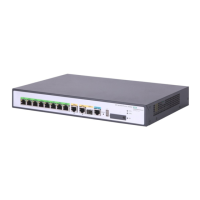273
all: Specifies all certificates, including the CA certificate and local certificates in the PKI domain,
excluding the RA certificate.
ca: Specifies the CA certificate.
local :Specifies the local certificates or the local certificates and their private keys.
passphrase p12passwordstring: Specifies a password for encrypting the private key of a local PKCS12
certificate.
3des-cbc: Specifies 3DES_CBC for encrypting the private key of a local certificate.
aes-128-cbc: Specifies 128-bit AES_CBC for encrypting the private key of a local certificate.
aes-192-cbc: Specifies 192-bit AES_CBC for encrypting the private key of a local certificate.
aes-256-cbc: Specifies 256-bit AES_CBC for encrypting the private key of a local certificate.
des-cbc: Specifies DES_CBC for encrypting the private key of a local certificate.
pempasswordstring: Specifies a password for encrypting the private key of a local certificate in PEM
format.
filename filename: Specifies a file name for storing a certificate. The file name is a case-insensitive string.
If you do not specify a file name for the certificates in PEM format, this command displays the certificates
on the terminal.
Usage guidelines
When you export the CA certificate, the following conditions might exist:
• If the PKI domain has only one CA certificate, this command exports the CA certificate to a
specified file or displays it on the terminal.
• If the PKI domain has a CA certificate chain, this command exports the certificate chain to a
specified file or displays it on the terminal.
When you export the local certificates, the local file names might not be the same as specified in the
command. The file names depend on the usage of the key pairs of the certificates. In the following
description, the filename is the specified file name in the command.
• If the key pair of the local certificate is for signing, the local file name is filename-sign.
• If the key pair of the local certificate is for encryption, the local file name is filename-encr.
• If the key pair of the local certificate is for general use (RSA or DSA), the local file name is filename.
If the PKI domain has two local certificates, one of the following results occurs:
• If you specify a file name, the local certificates are exported to two different files.
• If you do not specify a file name, the local certificates are displayed on the terminal, separated by
the system prompts.
When you export all certificates, if the PKI domain has only the CA certificate or the local certificates, the
result is the same as when you export the local certificates or the CA certificate separately. If the PKI
domain has both the CA certificate and the local certificates, you get the following results:
• If you specify a file name, each local certificate with its proper CA certificate chain is exported to
a separate file.
• If you do not specify a file name, all local certificates and the CA certificate or the CA certificate
chain are displayed on the terminal, separated by the system prompts.
When you export all certificates in PKCS12 format, the PKI domain must have a local certificate.
Otherwise, the export operation fails.

